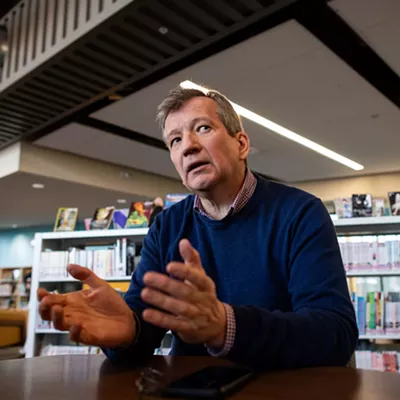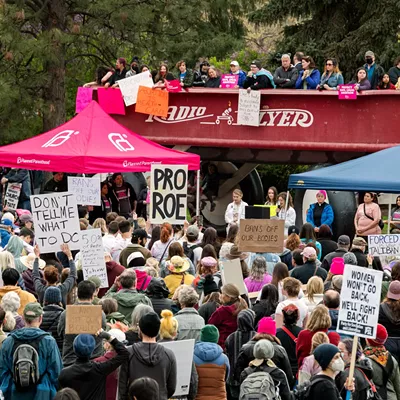Despite being "self-proclaimed anarchists," as the Spokesman-Review is fond of calling them, they didn't seem so scary.
The group included a Gonzaga University professor, a Jerry Garcia look-alike, a social worker and a young mother headed off to the Army. Some wore all black; others seemed better dressed for a round of golf. They got together on the Fourth of July -- as they had done for the past two years -- to march, celebrate freedom and call for social change.
They gathered on a shaded patch of grass in Peaceful Valley, beneath the Maple Street Bridge, to put the finishing touches on their signs. Several included provocative messages -- "We will not be silent," "If voting changed anything, it would be illegal," and "Burn this world to reveal another" -- but the group had no intention of provoking a confrontation with police. Last year, their march ended with 17 people in handcuffs, mostly on misdemeanor charges of trespass and failure to disperse.
This time, they got a permit to march legally (police would even provide an escort). And before taking to the streets, 20-year-old Tasia Martin reminded the 80-some participants to behave themselves. Make sure you don't carry anything that could be considered a weapon, Martin said, and listen to police instructions. "As soon as we enter [Riverfront] park, we're no longer covered by the permit."
Then came Tom Jeannot, a GU professor who read an essay on geopolitics and the American war machine. Then Travis Riehl stood up. (Last month, the 24-year-old received three years probation after breaking windows at military recruiting offices in 2005.)
"History shows us that revolutionary social change is not only possible, but inevitable," Riehl said. "You must act, and you must do more than hold a sign on a permitted march. ... Empires fall and another world is possible!"
The march began, winding down Main Street in Peaceful Valley, up a hill and north onto the Monroe Street Bridge. In front and at the rear, police officers rode motorcycles, redirecting traffic along the route. A drummer pounded out sporadic beats as the group went through several rallying cries.
"No justice, no peace, no violent police!" they chanted.
"Reform is no solution. We need a revolution."
"Obama, McCain. It's all the f---ing same."
The procession hooked a right on Bridge Avenue, turned south over the Post Street Bridge and eventually made its way to Main Street, past the River Park Square mall. Bystanders stopped and stared, shook their heads and laughed. A woman carrying shopping bags turned to a friend and said, "Oh, it's just a bunch of kids."
Then, one of the protesters shouted out, "Tell me what democracy looks like!" and, in unison, the group answered, "This is what democracy looks like!"
The parade turned onto Wall Street and entered Riverfront Park, which was packed with revelers (many of whom didn't appreciate having their revelry interrupted). The protesters broke out in the "Obama, McCain" chant, but this time, with kids in earshot, they cut out the f-word.
As they headed toward the clocktower, their reception grew colder. "Go away, buttheads," a fat man screamed. Then a shrill teenage girl: "You're blocking my way to the taco truck!" But several people also clapped and whistled in support as the group moved to an unoccupied part of the meadow beneath the clocktower. They put their placards message-side down, found places to sit and passed around vegan snacks.
It seemed almost comical in the end, how much hand-wringing and advance publicity the march received. The demonstration came and went without incident, without a showdown with police. But now, as the protesters milled around, they seemed satisfied. They smiled and shook hands, happy with the amount of the support they received when they entered the park. "It wasn't an entirely negative reception," Riehl said afterward.
Moments later, a man with a shaved head and angry look approached the group. Anticipating a confrontation, several moved in the man's direction, but before things could escalate, one of the protesters shouted a warning to his colleagues: "Let's not antagonize him."




















